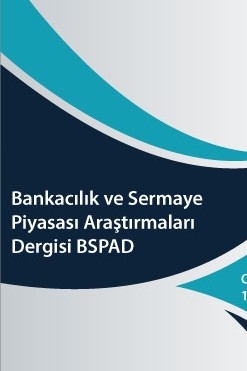Sosyal Sorumluluklara Yönelik Yeni Nesil Fon Türü - Sürdürülebilir (ESG) Yatırım Fonları
Bu çalışmada, iş dünyasında ve sermaye piyasalarında değişen algılar neticesinde ortaya çıkan sosyal sorumluluk doktrini ve sürdürülebilir (ESG) fonlar üzerinde durulmuştur. Çalışmanın teorik altyapısı, firmaların üst düzey yöneticilerin görevi sadece karı maksimize etmek anlayışındaki geleneksel politikanın günümüzde geçerliliğini yitirdiği üzerine kuruludur. Bu yaklaşım yerini sosyal sorumluluk politikalarının, şirketlerce daha fazla uygulanması gerektiği görüşüne bırakmıştır. Çalışma kapsamında 2014-2022 dönemine ait BIST-100 (XU100) ve BIST Sürdürebilirlik Endeksi (XUSRD) verileri analiz edilmiş olup her iki endeksin getiri performansı, risk düzeyi ve birbirleri ile olan korelasyonu hesaplanmıştır. Buna göre, Borsa İstanbul’da zarar görülen yıllarda (2015,2018) BIST Sürdürülebilirlik Endeksi’nin, BIST-100 karşısında daha iyi bir performans elde etmediği görülmüştür. Literatür ve ABD finansal piyasalarından farklı olarak Türkiye’de XUSRD endeksine ait standart sapmanın (risk düzeyi), BIST-100 endeksine göre daha yüksek olduğu tespit edilmiştir. Çalışmada, XUSRD endeksinin günlük volatilite (dalgalanma) haritası oluşturulmuş olup benzer şekilde, BIST-100 genel endeksine göre kısmen daha geniş bir bant aralığında getirilerin gerçekleştiği gözlenmiştir. Söz konusu veriler ışığında, Türkiye borsalarına yatırım yapan bir yatırımcı için, BIST Sürdürülebilirlik endeksinin, BIST-100 yatırımlarındaki riski azaltmak üzere bir hedging (riskten korunma aracı) olarak değerlendirilmemesi gerektiği sonucuna ulaşılmıştır
Anahtar Kelimeler:
Sosyal Sorumluluk, Para ve Sermaye Piyasaları, Sürdürülebilir (ESG) Fonlar, Yeşil Bono, Riskten Korunma
New Generation Fund Type for Social Responsibilities: Sustainable (ESG) Investment Funds
The social responsibility doctrine and sustainable (ESG) funds, which emerged as a result of changing perceptions in the business world and capital markets, were emphasized in the study. The theoretical background of the study is based on the fact that the traditional policy of the understanding of the task of the top managers of the companies is to maximize profit only, has lost its validity today. This approach has left its place to the view that social responsibility policies should be implemented more by companies. According to PWC, the share of these funds in Europe in 2025 will constitute approximately 50% of the total fund size managed. BIST-100 (XU100) and BIST Sustainability Index (XUSRD) data for the 2014-2022 period were analyzed and the return performance, risk level and correlation with each other of both indices were calculated within the scope of the study. Accordingly, it has been observed that the BIST Sustainability Index did not outperform BIST-100 in the years (2015 and 2018) in which Borsa Istanbul suffered losses. It has been determined that the standard deviation (risk level) of the XUSRD index in Turkey is higher than the BIST-100 index, contrary to the literature and the US financial markets. In the study, the daily volatility (fluctuation) map of the XUSRD index was created. Similarly, it was observed that returns were realized in a slightly wider band gap compared to the BIST-100 general index. In the light of the aforementioned data, it has been concluded that for an investor investing in the Turkish stock markets, the BIST Sustainability index should not be considered as a hedging tool to reduce the risk in BIST-100 investments.
Keywords:
Social Responsibility, Money and Capital Markets, Sustainable (ESG) Funds, Green Bonds, Hedging,
___
- Bioy, H. & Boyadzhiev, D. (2020). How Does European Sustainable Funds' Performance Measure Up?. Erişim Tarihi: 24.12.2020, Erişim Adresi: https://www.morningstar.com/content/dam/marketing/emea/shared/guides/ESG_Fund_Performance_2020.pdf
- Bloomberg (2021, July 20). BI expects ESG ETFs to reach $1 trillion and ESG Debt $11 trillion by 2025. Erişim Tarihi: 17.01.2022. Erişim Adresi: https://www.bloomberg.com/company/press/esg-assets-rising-to-50-trillion-will-reshape-140-5-trillion-of-global-aum-by-2025-finds-bloomberg-intelligence/
- Borsa İstanbul. Sürdürülebilirlik Endeksi. Erişim Tarihi: 24.12.2021, Erişim adresi: https://www.borsaistanbul.com/tr/sayfa/165/bist-surdurulebilirlik-endeksi.
- Borsa İstanbul. Endeks Verileri. Erişim Tarihi: 28.03.2022. Erişim adresi: https://www.borsaistanbul.com/tr/sayfa/175/endeks-verileri
- Business Roundtable (2019). Statement on the Purpose of a Corporation. Erişim Tarihi: 08.01.2020, Erişim adresi: https://opportunity.businessroundtable.org/ourcommitment/ EIRIS (2015). BIST Sürdürülebilirlik Endeksi Araştırma Metodolojisi. Erişim Tarihi: 10.01.2022, Erişim adresi: https://www.borsaistanbul.com/tr/sayfa/165/bist-surdurulebilirlik-endeksi
- Friedman, M. (1970) . The Social Responsibility of Business is to Increase Its Profits. The New York Times. Erişim Tarihi: 24.12.2020, https://www.nytimes.com/1970/09/13/archives/a-friedman-doctrine-the-social-responsibility-of-business-is-to.html.
- Hedblom, D., Hickman, B. R., & List, J. A. (2019). Toward an Understanding of Corporate Social Responsibility: Theory and Field Experimental Evidence (No. w26222). National Bureau of Economic Research.
- Humphrey, J. E., D. D. Lee, and Y. Shen (2012). Does it cost to be sustainable? Journal of Corporate Finance 18 (3), 626–639
- Kishan, S. & Chasan, E. (2020). Older ESG Funds Outperform Their Newer Rivals in Market Tumult. Erişim Tarihi: 20.12.2020, https://www.bloomberg.com/news/articles/2020-03-13/older-esg-funds-outperform-their-newer-rivals-in-market-tumult
- KPMG (2022). The European Green Deal Policy Guide. Erişim Tarihi: 12.03.2022. Erişim Adresi: https://assets.kpmg/content/dam/kpmg/xx/pdf/2022/01/green-deal-policy-guide-web-2022.pdf
- Morgan Stanley (2018). Sustainable Signals: Asset Owners Embrace Sustainability. Erişim Tarihi: 05.01.2021, Erişim adresi: https://www.morganstanley.com/assets/pdfs/sustainable-signals-asset-owners-2018-survey.pdf
- Morningstar (2022). Sustainable Funds U.S. Landscape Report. Erişim Tarihi: 13.01.2022, Erişim adresi: https://www.morningstar.com/lp/sustainable-funds-landscape-report Nofsinger, J. & Varma, A. (2014). Socially Responsible Funds and Market Crises. Journal of Banking& Finance, 48, 180-193.
- PWC (2021). 2022: The Growth Opportunity of the Century. Erişim Tarihi: 15.01.2021, Erişim adresi: https://www.pwc.lu/en/sustainable-finance/esg-report-the-growth-opportunity-of-the-century.html
- PWC (TY). From “nice-to-have” to “must-have. Erişim Tarihi: 15.01.2021, Erişim adresi: https://www.pwc.com.tr/sustainability-in-private-equity-industry
- Shefrin, H. & Statman, M. (1993). Ethics, Fairness and Efficiency in Financial Markets. Financial Analysts Journal, 49(6), 21-29.
- Statman, M. &Glushkov, D. (2009). The Wages of Social Responsibility. Financial Analysts Journal, 65(4), 33-46.
- Meadows, D. H., Randers, J., & Meadows, D. L. (2013). The Limits to Growth (1972). In The Future of Nature (pp. 101-116). Yale University Press (1972).. Erişim Tarihi: 15.11.2021. Erişim Adresi: https://www.clubofrome.org/publication/the-limits-to-growth/
- Trebucq, S. & d' Arcimoles, C. H. (2002). The Corporate Social Performance-Financial Performance Link: Evidence From France. Univ. of Bordeaux Dept. of Int'lAcc'tg Working Paper, (02-01).
- Verwijmeren, P. & Derwall, J. (2010). Employee Well-Being, Firm Leverage, and Bankruptcy Risk. Journal of Banking& Finance, 34(5), 956-964.
- Waddock, S. A. &Graves, S. B. (1997). The Corporate Social Performance-Financial Performance Link. Strategic Management Journal,303–319.
- Windsor, D. (2006). Corporate Social Responsibility: Three Key Approaches. Journal of Management Studies, 43(1), 93-114.
- ISSN: 2651-3560
- Başlangıç: 2017
- Yayıncı: Aysel GÜNDOĞDU
Sayıdaki Diğer Makaleler
Sosyal Sorumluluklara Yönelik Yeni Nesil Fon Türü - Sürdürülebilir (ESG) Yatırım Fonları
